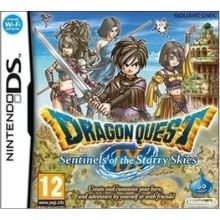In 2009, Level-5 released Dragon Quest IX: Sentinels of the Starry Skies for the Nintendo DS. The first local multiplayer in the series and restricted Nintendo Wi-Fi Connection support were both present in Dragon Quest IX. It was the first game ever to be launched on a portable gaming device and the first game to allow players to create their opponents. The game has several classic role-playing features, including turn-based combat and an experience point-based leveling system. The game was published by Square Enix in Japan in July 2009 and Nintendo internationally in July 2010. It was always going to be the one that was hardest.
In addition to surpassing all existing sales records in Japan, Dragon Quest IX also established a new record for the game’s anonymous chat feature. These two achievements originated in Japan. Critics in Japan and other countries have given the game good reviews.

| ROM | Dragon Quest IX: Sentinels of the Starry Skies |
| Console | Nintendo DS |
| Publisher | Nintendo |
| Genre | Role-Playing |
| Region | EU , US |
ROM Download: Mario & Luigi: Partners in Time ROM Download
Table of Contents
Gameplay
Many say that Dragon Quest IX is the most challenging game. The Dragon Quest series is famous for its tactical fighting. Although Nintendo Wi-Fi multiplayer features are not enabled, the game offers cooperative wireless multiplayer for up to four players. As the game proceeds, there may be additional players. In a multiplayer gaming session, each participant needs a game cartridge. Even though most games have at least three save spaces, there is only one accessible one here.
In Dragon Quest IX, the player is responsible for picking and constructing their squad. This is mainly because the game is meant to be played cooperatively. Compared to past games, the player has a more significant influence over how their character appears. At any point during the games’ storylines, players may pick whether to adopt the role of a male or female hero or heroine. In contrast, Dragon Quest IX allows players more excellent choice over the aesthetic of their characters, including the hero or heroine role they choose to play and details like haircuts and skin tones.
Every character has the chance to have their appearance personalized both at the start of the game and throughout the voyage. Players may adjust a character’s look during the creation process by picking their gender, hair and eye color, body type, skin tone, and profession (the game’s word for the character’s class). Players may further personalize their avatars by deploying weapons and armor in towns, on the global map, and in combat. This is made feasible by the presence of these goods in the basic gameplay.
The employment of each playable character specifies their talents, which grow as the player levels up, as well as their access to gear and equipment. You may pick from several characters early on in the game, such as soldiers, wizards, priests, martial artists, thieves, and minstrels. It is possible to obtain access to six extra courses by completing tasks. The armamentalist, ranger, gladiator, sage, paladin, and luminary are some of the popular classes in the game. Any one of the six primary jobs open to the main character will enable them to form a group as a minstrel. You may either utilize the creative ability “Jack’s Knack” to change your profession or speak to the “Jack of Alltrades” at Alltrades Abbey. While playing the game, the player has the chance to alter the employment of their character.
Each profession has its levels and cumulative experience, and a character’s traits and spells depend on the task they are now engaged in. The game’s skill system is comparable to Dragon Quest VIII’s. Shield or Fisticuffs are the character’s unarmed abilities, and three of their weapon skills are shared with the profession of at least one other character. As the game goes, the characters will collect skill points. The character may increase any of their current profession’s abilities with these points. A new characteristic (passive benefit) or ability (active command) is obtained every time a particular quantity of points is spent on talent. The maximum points that can be used for talent are 100. Hence you need 100 points in your bank account to unlock the tenth skill or characteristic. Unused skill points, talents, and attributes obtained through the skill system may be employed to construct new professions. A character may employ shields with any profession if they hold the 100-point shield characteristic and vice versa if they possess the 100-point weapon skill trait.
Features
Both during and after Dragon Quest IX’s main adventure, the player has the opportunity to engage in side tasks. With missions, which are simply side tales, the player may aid individuals who aren’t actually in the game. When working on a range of initiatives, some rely on one another, while others aid you get closer to other goals. Typically, the game begins with the primary aims of defeating monsters, discovering a magical spring, and committing stealing for the benefit of another thief. In contrast to earlier games, mini-quests in Dragon Quest IX features optional outcomes. Upon completion of each job, a “Quest List log” will be made available. Achievements in gaming are noted in this diary.
The player may earn money and engage in non-game-related fighting by utilizing the extra treasure maps that keep cropping up throughout the game. Alchemy is a method that may be used to produce swords, armor, and other types of weapons. The “Krak Pot” is an alchemical pot that may be used to blend ingredients and products. Monsters, the world map, and treasure boxes all drop these things. The player may produce new recipes and employ ones already made and placed on bookshelves scattered over the city.
To watch the action, both first-person and third-person perspectives are utilized. To view the main character’s party and the monsters involved in the conflict, the player character may pick which opponents to target while attacking—even particular creatures within a single group. During a fight, both the player and the enemy may use combos. If an attack is followed by two or more attacks on the same victim, the damage done by the initial assault is exacerbated. It is 1.1x for two consecutive hits, 1.5x for three straight hits, and 2.0x for a four-hit combo in North America and the United Kingdom. Each combat results in experience points being provided to the party members depending on their level. Higher-level characters frequently obtain a higher proportion of the available experience points. Players who die in combat may still gain experience points depending on how much of the fight they were able to finish before being put out by their wounds. Players may build up their power reserves before completing their next attack or spell in Dragon Quest XII, which reintroduces the tension that was initially present in Dragon Quest VIII. In this method, some species may be awakened. A party member who provokes numerous adversaries in one action faces the threat of being the target of a combination owing to the focused attacks of the offending party member. When frightened, an opponent will focus on the person who insulted them.
The Tactics system, which was first introduced in Dragon Quest IV, enables the player to guide the protagonist’s actions or define various AI settings for the other party members. Don’t Use MP prioritizes avoiding using MP, Show No Mercy prioritizes inflicting damage, and Focus on Healing prioritizes healing.
FAQS
How difficult is it to master Dragon Quest XII?
It’s unfortunate if anybody thought it was too challenging since DQIX will be far more challenging. The series creator, Yuji Horii, said, “We planned the game to be quite challenging.” Since the enemies are more dangerous than in any previous game in the series, it is more challenging. These kinds of events are possible because of what we did.
How long is Dragon Quest’s ninth installment?
If you focus on the main quest objectives, you may finish Dragon Quest IX: Sentinels of the Starry Skies in 4812 hours. As a result, if getting an excellent grade is your objective, it will probably take roughly 741 hours to complete.
Is a new Dragon Quest 9 in the works?
Despite Square Enix’s prior discussions about a remake or port of Dragon Quest 9, neither notion is supported by any evidence.
Which Dragon Quest game takes the longest to complete?
The Dragon Warrior VII game is the longest in the current iteration of the series, taking an average of 260 hours to complete. The duration of the Dragon Quest games is well-known. You may play the JRPGs in whatever order you choose since each has its own story.
Is Dragon Quest 12 coming out?
Since the release of Dragon Quest 11, we haven’t heard anything regarding a new Dragon Quest game. The game’s name, Dragon Quest 12: The Flames of Fate, is appropriate.
conclusion
As of January 1, 2009, research by Famitsu magazine found that Dragon Quest IX was the title that Japanese gamers were most looking forward to. The game had the most participants for the first time in 15 months. The Japanese gaming publication Famitsu awarded the game a perfect score of 40 only a few days after its debut. Consequently, Dragon Quest IX became just the eleventh video game in history to achieve a faultless score. It also won the reader poll for the year’s most significant game on Dengeki Online. Jeremy Parish, the editor of 1UP.com, gave the game a solid review in his preview.
Dragon Quest IX has garnered multiple accolades. Due to the good reviews it garnered at E3, GameTrailers put it up for the Best DS Game of the Show award. Gamasutra rated the #1 portable game of 2010 based on their assessment criteria. GameSpot called it the best DS game of 2010. Additionally, in 2010 Nintendo Power awarded Dragon Quest IX the titles of “Best DS Game of the Year” and “Best RPG.”

